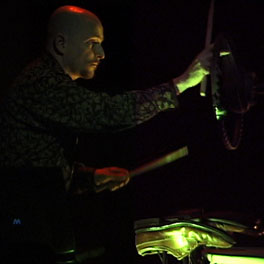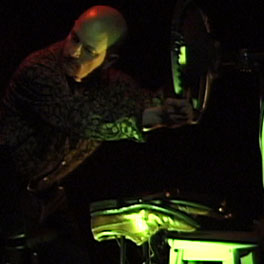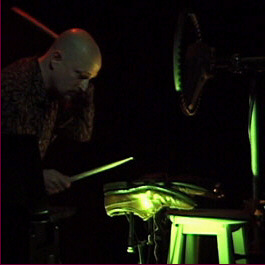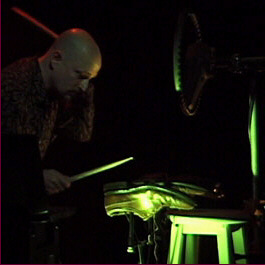 It was a dark, freezing night, and we sat in the subterranean theater of Greenwich Village’s storied Cornelia Street Café waiting for Joshua Fried to perform his Radio Wonderland—the final act of an evening of new music in the “Serial Underground” series presented by Composers Collaborative, a New York-based nonprofit devoted to the promotion of new music.
It was a dark, freezing night, and we sat in the subterranean theater of Greenwich Village’s storied Cornelia Street Café waiting for Joshua Fried to perform his Radio Wonderland—the final act of an evening of new music in the “Serial Underground” series presented by Composers Collaborative, a New York-based nonprofit devoted to the promotion of new music.
Intermission. Background music plays, forks clink on restaurant stoneware, orders are placed at the bar. At some point, a smooth-pated gentleman stands in the narrow aisle of the theater. The boom box in his hands is the only thing that marks him out. He slowly, discreetly walks down the aisle and up to the stage. No one seems to notice. Laughter. Voices. Glasses are set down on wooden tabletops.
 One element begins to stand out from the din: radio. Live radio. Someone is scanning the dial. Fried approaches the stage. Commercials. Music. DJ chatter. The static between stations. Radio Wonderland has begun, and the majority of the audience is still buzzing away—chatting, unaware. Slowly the sounds from the work insinuate themselves into the theater’s noise. Gradually the crowd takes note, quiets down: eyes and ears focus on the stage.
One element begins to stand out from the din: radio. Live radio. Someone is scanning the dial. Fried approaches the stage. Commercials. Music. DJ chatter. The static between stations. Radio Wonderland has begun, and the majority of the audience is still buzzing away—chatting, unaware. Slowly the sounds from the work insinuate themselves into the theater’s noise. Gradually the crowd takes note, quiets down: eyes and ears focus on the stage.
This is what we hear:
an ad for the Dodge Charger Chic’s “Freak Out” an R&B song lyric “…out of harmony…” “…excellence acclaimed citywide…” a Donna Summer song “…GM dealer…” “…ready for most anything…” “…who knows what’s down the road…” “…only mean one thing…” “…speaks five…six languages…” “…I’m allowed to cry cry cry cry cry…” fragments of FM transmissions. the audience tittering as the percussion kicks in.
Radio Wonderland is a piece performed by Joshua Fried with a laptop, a pair of drumsticks, a steering wheel, four men’s shoes mounted on a stand, and a live radio feed. Sound is pulled from the radio, sent through the computer and various digital processors, and shared with the audience via the Musical Shoes and the Musical Wheel—instruments Fried created—and via a customized set of algorithms and processes which Fried programmed into th laptop. Beats of modulated audio are selected by drumming on the soles of the shoes, and the pitch and sound is “driven” to the amplifiers by turning the steering wheel, which manipulates pitch and tempo. The effect: Recognizable songs enter an aural Twilight Zone, oscillating between the familiar and the incomprehensible.
 When pulled through the cables and wires and processors in this digician’s bag of tricks, Fleetwood Mac’s “Landslide” becomes a dirge; Stevie Nicks’ vocals sound like those of a Delta bluesman. Billy Joel’s “Just the Way You Are” is stretched and kneaded so that the lyric “I said I love you” becomes the keynote and the poetry has been completely recast.
When pulled through the cables and wires and processors in this digician’s bag of tricks, Fleetwood Mac’s “Landslide” becomes a dirge; Stevie Nicks’ vocals sound like those of a Delta bluesman. Billy Joel’s “Just the Way You Are” is stretched and kneaded so that the lyric “I said I love you” becomes the keynote and the poetry has been completely recast.
Part mad scientist, part mixmaster, part performance artist, Fried is driving the moment. He composes like the kings and queens of jazz— minute by minute. No two renditions of Radio Wonderland will ever be the same. Each string of syllabic and symphonic staccato arrives unpredictably. His play with these “found sounds” owes as much to John Cage, Steve Reich, and Robert Rauschenberg, as they do Igor Stravinsky, Run-DMC, and Danger Mouse. His look onstage approaches a twenty-first century monk set loose in Marcel Duchamp’s studio. Popular culture provides the ingredients but one is left to draw one’s own conclusions about what it means to rescramble them, chop them into minimal elements, or ride them jazzwise. No more well-tempered klavier, these scales are fishy bites of others’ works along with programming from a “lite FM” radio station. With lyrics rewritten on the fly this is fusion music transformed into something you’ve never tasted before.
 Fried is cool under pressure, and never loses his sense of humor. Confronted with a technical glitch onstage he remains calm and cool, observing that depending on his electronic band was “like having an improvising partner who never listens.” There is something playful in this musical wonderland, an openness that brings the crowd to a chuckle and even full-on laughter every so often—usually in reaction to the deadpan shifts in the music.
Fried is cool under pressure, and never loses his sense of humor. Confronted with a technical glitch onstage he remains calm and cool, observing that depending on his electronic band was “like having an improvising partner who never listens.” There is something playful in this musical wonderland, an openness that brings the crowd to a chuckle and even full-on laughter every so often—usually in reaction to the deadpan shifts in the music.
Eclectic and open, Joshua Fried’s influences vary widely—on the one hand coming from his musically inclined family and the piano lessons of his childhood: on the other coming from his own experience of “black” music, jazz, progressive and punk rock, and— seemingly—everything in between. In addition to his solo recordings and performances, he has worked with experimental-guitar legend Fred Frith, 70s dance and soul sensation Chaka Khan, and indie rock favorites They Might be Giants.
I wanted to ask Fried how a little boy from L.A. who wanted to be a drummer became a familiar face in New York City’s downtown music scene, someone who’s played at venues ranging from CBGB to Lincoln Center, and has, in a short time, gone through fellowships from the National Endowment for the Arts and the New York Foundation for the Arts, as well as residencies at Yaddo and the Rockefeller Foundation’s Bellagio Center. But writing up his answers as a Rolling Stone interview didn’t feel like quite the right format. Fried mixes the ingredients of popular culture like a master chef — why was I going for depth? So instead I thought back to my own formative pop culture years, and emailed him my Teenbeat Wonderland Questions for Joshua Fried….
What was the first concert you attended? Tom Waits, at McCabe’s Guitar Shop, Santa Monica, California, in 1974
What was the last concert you attended? La Monte Young, in NYC in 2005
Can you provide a top-ten list (a.k.a. desert-island discs)? In no particular order: 1. Le Tombeau de Couperin, Maurice Ravel 2. Kindertotenlieder, Gustav Mahler 3. Triumph, The Jacksons 4. Metal Box, PiL 5. Blonde on Blonde, Bob Dylan 6. A certain mix tape I made with: Crystal Waters and Steve Silk Hurley Mix, Seal/Trevor Horn Mix, Quincy Jones/Chaz Jankel single, Chic, New Order 7. Liege and Lief, Fairport Convention 8. Exodus, Bob Marley and The Wailers 9. King Tubbys Meets Rockers Uptown, King Tubby/various 10. Comes a Time, Neil Young
Do you have a musical guilty pleasure? I no longer feel guilty about it! Cher “Believe,” The Beach Boys’ “Kokomo,” lots more.
How do you organize your physical music collection? Alpha by performer and/or composer, for CDs. By genre and performer sub-categories, for vinyl
When you listen to music, what percentage of your time is spent listening to: CDs: 15 % Vinyl: 10% Digital: 25% Live: 35% Radio: 10% Digital radio: 5%
Which magazines do you read/buy regularly? Wired The Nation Shift
When was your first public performance of Radio Wonderland? Well, you could say I’ve been doing it since I first mixed shoes and radio in 1989. But I think of the Radio Wonderland debut as 2000, when I first used ALL radio and computer processing instead of lots of little boxes.
What do you think of the music of Moby? I went through a Play phase, and I’m not entranced by the later (or earlier) stuff.
What do you think of the music of Beck? I went apeshit over Mellow Gold and Odelay, and so why am I not all amped about his newer stuff? Is it my loss? Maybe. Help me. I’m lost.
Any thoughts on the new hipster-cultural Jewish scene in NYC? I hope they’ll be nice to me.
Which three living musicians would you most want to collaborate with? 1. Brian Eno 2. Brother James Brown 3. Bob Dylan
Which three dead musicians would you most want to collaborate with? 1. Frank Sinatra 2. Fela Kuti 3. Bob Marley
If you could offer one New Year’s Resolution to the music industry, what would it be? Surrender.
Favorite radio station: WBAI
Favorite musician: Bob Dylan
Favorite Jewish musician: Bob Dylan
Favorite visual artist: Henri Matisse
Favorite author: James Joyce
Favorite song:“I Have a Million-Dollar Check for You,” sung to the tune of “Happy Birthday”
Favorite food: Noodles
Favorite color: Very pale blue-green
Favorite drink: A particular mostly green Taiwanese oolong tea
Favorite movie: 2001: A Space Odyssey
Favorite TV show: The Prisoner
Favorite radio show:“Solid State with Liquid Todd”
Did you have a bar mitzvah? I don’t think you’d call it that, but my parents did concoct something highly post-Freudian, in our home.
What is it you remember most about that day? I gave a heartfelt speech, at the end of which I broke down and cried. Later, alone with my thirteen-year-old girlfriend, Dee Dee, I lay down on the bed and covered my face with the pillow. After a pause, she spoke with measured concern bordering on patronizing: “What are you doing?”
“I’m being thirteen,” I replied.







